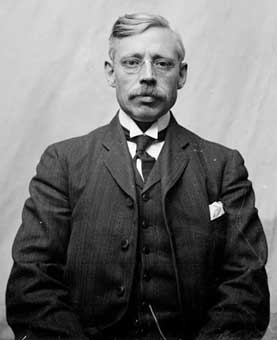|

Charles Phillips, 1905
Thanks to
WilhelmThe2nd from
Chessgames.com
From 'The Week' chess column (edited by Charles Phillips) March 19th,
1885, pg.253:
STEINITZ ON MORPHY
"The leading feature of the ‘International Chess Magazine’ for
January, February and March, is Herr Steinitz’s critique of Paul Morphy. Both
his premises and conclusions have been furiously assailed by the leading chess
writers in the United States. They appear to have enshrined Morphy as the God of
Chess, and to resent with the bigotry of idolaters the slightest approach to
skepticism on the part of those who reject their creed.
However much we may doubt his discretion there can be no question
of Mr. Steinitz’s courage. A stranger in America, his chief object to firmly
establish his new literary venture, he dares to assail at the outset of his
American career the pet dogma of the very people on whom he must depend for the
support necessary to the success of his undertaking.
The question in dispute is simply this: Americans everywhere declare that
Morphy, the peerless chess player of twenty-five years ago, was the superior,
not only of the best men of his time, but also of the doughty champions of
to-day. Steinitz begs leave to doubt this. Hence the storm. For ourselves we
cannot but think that those who so firmly believe in the genius of their late
champion would choose a more dignified course if they confuted Herr Steinitz’s
arguments instead of abusing himself. However, we believe firmly that Paul
Morphy would have defeated just as easily Messrs. Zukertort, Steinitz and Co.,
as he did their teachers.
One point relied by Steinitz is the fact that there were a number
of errors of judgment or analysis in many of Morphy’s games. Now, while this if
proved (and we think it has been) would demonstrate Morphy was not infallible,
it by no means demonstrates that Morphy was inferior to the men of to-day.
First, he may have made less mistakes proportionately than they, and secondly,
his play on the whole may have been so superior to theirs as to more than
counterbalance the errors. The records of modern match and tournament play
abundantly testify that both these suppositions are correct.
Another point made by the editor is that Morphy did not have to
play under the modern time limit, and therefore was not hampered by this
restriction. Surely Steinitz cannot but be aware that the time by Morphy in his
matches was accurately recorded, and that he averaged between twenty and thirty
moves per hour.
A vote of thanks should be tendered to Herr Steinitz (instead of
abuse) by those who believe in Morphy’s superiority. A careful perusal of the
article in connection with the records in question will thoroughly convince any
impartial reader that so far from making out a case, the writer has unwittingly
but added another monument to the genius and unrivalled power of the late
lamented master."
return |

